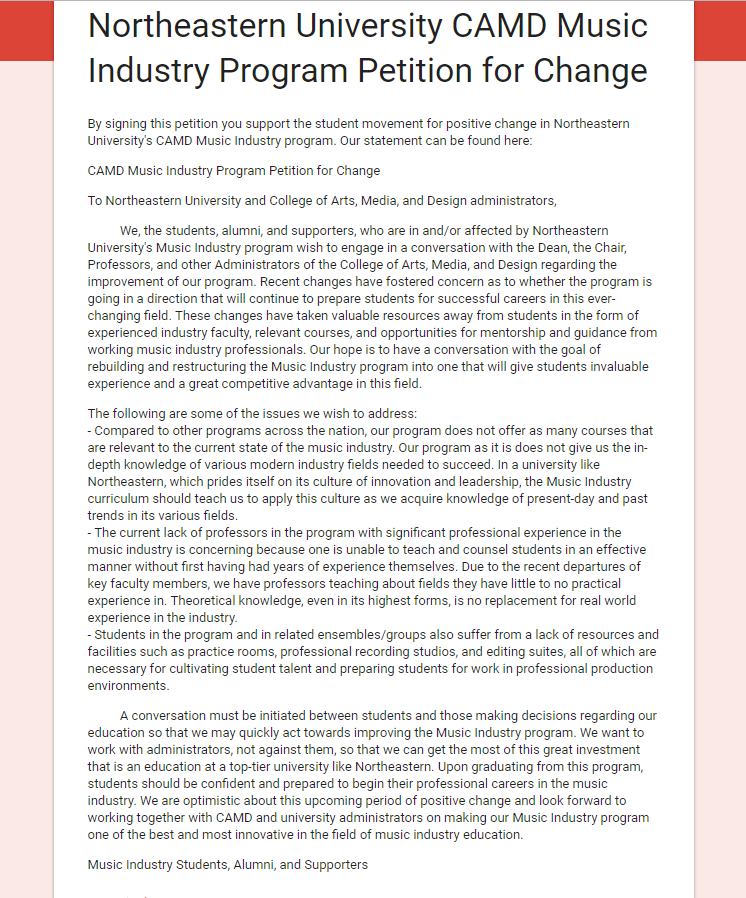By Elissa Taublib, news staff
A petition requesting new courses in the Northeastern music department and more resources within the College of Arts, Media and Design (CAMD) gathered 320 signatures from students, alumni and others who are affected by changes in the department. The petition was sent to the dean and all other members of the CAMD administration Friday.
The petition demands new courses related to the current state of the music industry, professors with more experience in the field and more on-campus practice rooms and professional recording studios.
Fourth-year music industry major Nike Brannstrom, who signed the petition, said music curriculum should be more flexible and students should be required to take courses on topics such as copyright in the music industry. Brannstrom also said the practice spaces in Ryder hall are overcrowded and outdated.
“Now it’s the perfect time to turn to the students and ask us what we want, and that’s the idea of the petition,” Brannstrom said. “The biggest frustration for me is a lack of awareness of what we want, feeling like I don’t have a huge voice when it comes to my own education.”
The petition, written by third-year music industry major Cairo Marques-Neto, was first distributed on Sept. 24 in the private Northeastern music industry page on Facebook and on pages of Northeastern’s student organizations involved in the program.
Marques-Neto said he wrote the petition to engage the student body in a conversation with CAMD administrators and faculty members about improving the music industry program. Marques-Neto said he intends to bridge the gap between students and administrators to create positive change.
“There has been no formal conversation, and that’s what I’m looking to have: a conversation to say these are issues that we as students have, and you as administrators have a responsibility to create a program that will prepare us for a successful career,” Marques-Neto said. “I want to leave here knowing that future classes will be prepared better than I was.”
In an official statement, CAMD Dean Elizabeth Hudson said the college administration appreciates the students’ concerns and their dedication to the future success of the program.
“This is a conversation with which we are eager to engage,” Hudson said. “Indeed, these are the very concerns that CAMD and the music department have already been working hard to anticipate and address. Recent investments in the program include the hiring of new faculty and industry specialists, upgrades to recording facilities and a complete revision of the music industry curriculum, with changes being rolled out during the fall and spring semesters.”
Marques-Neto said the number of practice rooms and professional recording studios is not enough to satisfy the demand of music industry students on campus. He said editing suites could be built in the studios of Ryder Hall to allow more students to get hands-on recording experience.
Marques-Neto said he is concerned about the music industry curriculum and hoped electives and required courses become geared toward the current state of the music industry.
Music professor and Department Chair Daniel Godfrey said the lack of space to practice is frustrating for both him and his students. However, he said administration just obtained permission to establish a keyboard lab, and that this will take a lot of the pressure off the other practice spaces.
“We are really trying to make the best we can with the space we have,” Godfrey said. “We have state-of-the-art recording facilities, and this summer we put $25,000 into them to bring them up to date. This semester was difficult and we couldn’t offer all electives we usually offer, but next term we are offering eight electives.”
He also said many CAMD faculty members retired at the same time and he is dedicated to hiring new, qualified professors. Despite the challenging circumstances, he said the opportunities for improvement of the program are great and added that he values the students input.
Marques-Neto said future faculty advisors should be mentors to the students and should be able to share their professional experiences with them.
“I want to make sure that the people who are coming in are not just coming in because they have doctorates or masters,” Marques-Neto said. “When it comes to music industry, a doctorate degree is no replacement for years of experience.”
Godfrey said the music industry program is a network and once students graduate they look after each other. In his opinion, the concerns Marques-Neto and the other students expressed about having a vibrant program across generations is terrific.
“I have met and been in touch with a lot of alumni, that’s one piece of it,” Godfrey said. “But I don’t think I’ve managed to meet enough current students and really work with them as a group, and this is a real stimulus for me to do that. I want students to know that my ears are wide open.”









